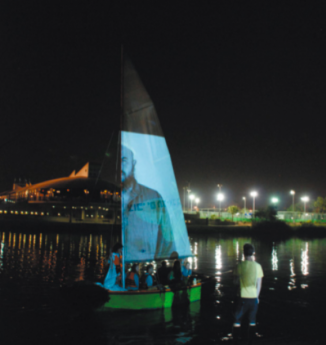This project wishes to bring together artists and thinkers interested in rethinking a range of accepted geo-political realities. It focuses both on the theoretical formulation and actual creation of independent spaces: new physical and theoretical meeting points positioned outside the boundaries of any one clearly defined place.
Exterritory aspires to reshuffle existing, territory-related distinctions between host and guest, local and foreign, guide and visitor, citizen and non-citizen. By using this unoccupied space and exploring different ideas of ex-territoriality, we wish to underscore the need for creating unstable sites that could serve as point of departure from familiar ways of experiencing political concepts – in order to respond to urgent ethical dilemmas. We hope that this unstable, dynamic notion will become both a catalyst and a tool for critically reflecting upon discriminating cultural concepts of geography. The Exterritory project was initiated during the summer of 2009, in response to the Israeli-Palestinian conflict. Within the framework of the current project, we would like to realize our initial idea – that of embarking on a journey that will involve open meetings between artists, thinkers, political activists, and other interested individuals and groups. The meetings will be held in ex-territorial waters, and will involve the coming together of numerous boats from around the world. Our aim is to engage with the concept of ex-territoriality as both a practice and a subject of theoretical study.
About the artist
Our work has been consistently concerned, in different ways, with the questions raised by the current project. Exterritory represents our sense of urgency concerning the need to produce, parallel to our artistic practice, an interdisciplinary space that goes beyond existing conventions of making and exhibiting art.
The WHW collective, which curated the 11th Istanbul Biennial (2009), defined our work as: “[…] unapologetic shots of explicit dialogues and intimate contact between strangers….” Kathrin Rhomberg, the curator of the 6th Berlin Biennial (2010), wrote that: “Ruti Sela and Maayan Amir penetrate deep into the private and there discover the political. … Their work provide striking glimpse into the interior of Israeli society. … They expose fundamental mechanisms of power.” Charles Merewether, curator of the Sydney Biennale (2006), remarked that our work: “[…] operate[s] within a field of laboratory, a domain where language and materials […] interrogate scientific and imagined models of utopia [..].” And Vit Havrank curator of the Tranzit collective, wrote that: “If we don’t believe a global revolution […] then we must search for and create blind spots between the borders of nation states – and that is the ‘Exterritory’.[…]” In 2011, we received a UNESCO award honoring our “outstanding endeavors for the innovative project Exterritory.

